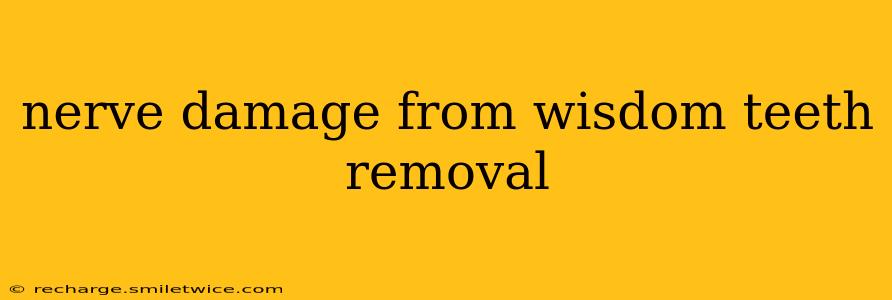Wisdom teeth removal is a common procedure, but like any surgery, it carries potential risks. One of the most concerning complications is nerve damage. This comprehensive guide explores the causes, symptoms, and recovery process associated with nerve damage following wisdom teeth extraction. We'll also address frequently asked questions to provide a complete understanding of this potential complication.
What Causes Nerve Damage During Wisdom Teeth Removal?
Nerve damage after wisdom teeth removal is usually caused by the proximity of the inferior alveolar nerve (IAN) to the lower wisdom teeth. This nerve controls sensation in the lower lip, chin, and part of the tongue. During the extraction process, if the nerve is accidentally stretched, compressed, or severed, it can lead to temporary or permanent nerve damage. The risk is higher in cases where:
- Teeth are impacted: Impacted wisdom teeth, those that are partially or fully embedded in the jawbone, often lie closer to the IAN, increasing the chance of accidental injury during removal.
- Complex extractions: Extractions requiring significant bone removal or sectioning of the tooth are more likely to result in nerve damage.
- Anatomical variations: Individual variations in jawbone structure and nerve pathways can increase the risk.
- Surgeon's experience: While highly skilled surgeons minimize risks, the possibility remains.
What are the Symptoms of Nerve Damage After Wisdom Tooth Removal?
Symptoms of IAN nerve damage can vary in severity and duration. They can include:
- Numbness: This is the most common symptom, affecting the lower lip, chin, and/or tongue.
- Tingling: A pins-and-needles sensation in the affected area.
- Pain: Sharp, shooting, or burning pain in the lower jaw or affected areas.
- Weakness: Difficulty moving the muscles in the lower lip or chin.
- Altered taste: Changes in the ability to taste.
How Long Does Nerve Damage from Wisdom Teeth Removal Last?
The duration of nerve damage varies greatly. In many cases, the numbness or tingling is temporary and resolves within weeks or months. However, in some instances, the damage can be permanent. The recovery time depends on several factors including the severity of the damage, individual healing capabilities, and the type of nerve injury. Regular follow-up appointments with your oral surgeon are crucial to monitor progress and ensure proper healing.
Can Nerve Damage from Wisdom Teeth Removal Be Permanent?
While most cases of nerve damage after wisdom teeth removal are temporary, permanent damage is a possibility. The likelihood of permanent nerve damage is low but is a significant concern. The severity of the injury and the individual's response to treatment directly impact the outcome.
How is Nerve Damage from Wisdom Teeth Removal Treated?
Treatment for nerve damage depends on the severity and duration of symptoms. Options may include:
- Time: Many cases resolve spontaneously with time.
- Medication: Pain relievers and anti-inflammatory drugs may help manage pain and inflammation.
- Physical therapy: Specific exercises can help improve nerve function.
- Surgery: In rare cases, surgical intervention may be necessary to repair the damaged nerve.
What Can I Do to Minimize the Risk of Nerve Damage During Wisdom Teeth Removal?
Choosing an experienced and qualified oral surgeon is crucial in minimizing the risk of nerve damage. A skilled surgeon has the expertise and knowledge to perform the procedure with precision and care, reducing the likelihood of complications. Be sure to discuss your concerns and medical history thoroughly with your surgeon beforehand.
What is the Recovery Process Like After Nerve Damage from Wisdom Teeth Removal?
Recovery from nerve damage varies. Regular follow-up appointments with your oral surgeon are essential for monitoring progress. Your surgeon will assess your recovery and discuss further management strategies as needed. Patience and consistent follow-up are key to optimal recovery.
Are There Long-Term Effects from Nerve Damage After Wisdom Teeth Removal?
Long-term effects are possible, but vary from person to person. Some individuals may experience persistent numbness or tingling, while others may see a complete resolution. The long-term outlook largely depends on the initial severity of the injury and the efficacy of treatment.
This information is for general knowledge and does not constitute medical advice. Always consult with a qualified healthcare professional for any health concerns or before making any decisions related to your health or treatment.
